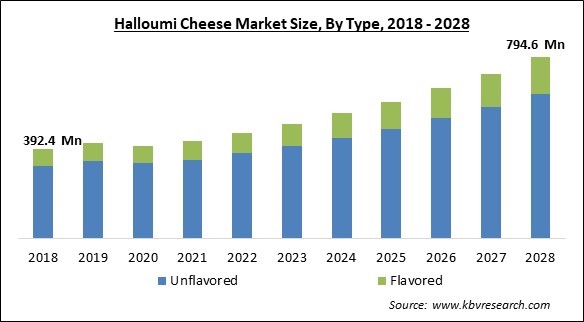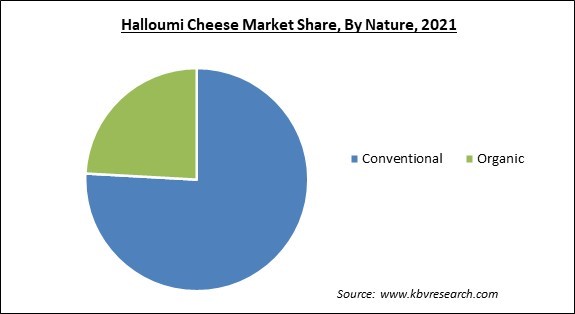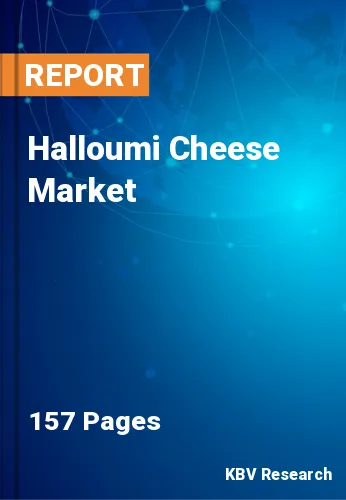The Global Halloumi Cheese Market size is expected to reach $794.6 Million by 2028, rising at a market growth of 9.4% CAGR during the forecast period.
Pasteurized or unpasteurized, goat, cow, or sheep milk is used to make halloumi cheese, its flavor is acidic, salty, and savory, and its texture is semi-hard, brined, and just a little spongy. Halloumi cheese is rich in calcium, zinc, magnesium, phosphorus, vitamins A and B (B1, B2, and B3), fat, and protein. It is frequently used in salads, sandwiches, fried foods, and burgers. In urban families and throughout the food processing industry, cheese has become increasingly popular.

Halloumi cheese has been the most promising market during the past few years. Halloumi cheese is simple to digest, in contrast to other cheese, which is harder to digest as well is high in fat and cholesterol. Depending on the constituents and manufacturing technique, the color of halloumi cheese can range from white to yellow.
Although this cheese can be eaten fresh, it's typically cooked or shredded over hot food. The halloumi cheese was traditionally made in Cyprus, a nation between Europe and the Middle East. Traditionally, ovine milk (sheep milk) is used to make halloumi cheese. There is no particular way to make halloumi cheese as the process, and the finished product frequently varies around Cyprus.
The rise in cross-cultural interaction brought on by widespread travel is responsible for the halloumi cheese market's expansion. Also, the market for halloumi cheese has benefited from the rising popularity of eating out. Because it stays hard even after being grilled, halloumi cheese is also regarded as a meat substitute for the world's vegetarian population. Increased industry adoption of these outlets and an increase in the number of food service outlets further contribute to the market's expansion.
The production and distribution of halloumi cheese experienced difficulties in the continent. Most prominent halloumi cheese-producing companies banned most of their incoming commerce due to the pandemic. Furthermore, halloumi cheese was particularly hard to come by as a result of a severe shortage of raw milk for the manufacturing process, which prevented Cyprus manufacturers from keeping up with the rising demand. Therefore, the pandemic had a severe negative impact on the halloumi cheese market.
Due to the coronavirus outbreak, which caused stay-at-home requests and raised concerns about sanitization, the practice of home-cooked meals has greatly increased among the working population. This is boosting the market's growth by raising demand for halloumi cheese. In addition, the major corporations are creating creative packaging to increase the product's attractiveness among health-conscious consumers. Consequently, halloumi cheese is growing in acceptance in salads, sandwiches, hotdogs, and pizzas, offering the market a profitable opportunity for expansion.
Halloumi cheese is currently being developed by producers in variations, including mozzarella, provolone, and cheddar, to satisfy the desires of health-conscious people who do not want to sacrifice flavor. Halloumi cheese consumption and demand are rising due to consumer health consciousness. The consumption of halloumi cheese has become an important alternative to the consumption of cheese made from bovine milk, and it is anticipated that this trend will continue to rapidly develop over the projected time. Cheese production technology improvements and higher-quality halloumi breeds also drive the market.
Halloumi cheese is not well known, presenting a market problem. Compared to conventional cheese, low-fat cheese is less well-known. Flavor and texture are crucial components in the cheese industry. Therefore, consumers are more focused on the flavor and texture of the cheese. Yet, modifications to texture and taste are a market limitation. Additionally, halloumi is inappropriate for individuals who follow a vegan or dairy-free diet. Also, vegetarians should carefully read the ingredient list since certain types are made using rennet obtained from animals. This substance vegetarians cannot consume made in ruminant animals' stomachs, including cows, sheep, and goats. Hence, all these factors may result in the slowed growth of the halloumi cheese market.
Based on type, the halloumi cheese market is categorized into flavored and unflavored. The unflavored segment garnered the highest revenue share in the halloumi cheese market in 2021. No additional ingredients that may change the flavor of the cheese are included in primary or unflavored halloumi. The production of plain halloumi cheese, which normally just contains salt, may occasionally involve milk other than ovine milk. The segment's growth results from a rise in the demand for plain or unflavored halloumi cheese at quick-service eateries, fast-food restaurants, and full-service establishments.
On the basis of end use, the halloumi cheese market is divided into food service and residential. The food service segment acquired the largest revenue share in the halloumi cheese market in 2021. The rise of fast-food establishments is responsible for this segment's domination. Also, consumers' rising reliance on fast food for nutrition has contributed to the expansion of the food service sector. There are many different types of restaurants included in the food service industry. There are fast food joints, full-service restaurants, and restaurants that offer quick service.
Based on nature, the halloumi cheese market is segmented into organic and conventional. The organic segment garnered a remarkable growth rate in the halloumi cheese market in 2021. Due to the health benefits connected to organic food, consumers' demand for healthy and nutrient-dense options is predicted to increase throughout the projection period. For example, the milk of goats fed organic diets is used to make organic halloumi cheese. Although more expensive than regular halloumi, organic halloumi is far healthier.

| Report Attribute | Details |
|---|---|
| Market size value in 2021 | USD 427.5 Million |
| Market size forecast in 2028 | USD 794.6 Million |
| Base Year | 2021 |
| Historical Period | 2018 to 2020 |
| Forecast Period | 2022 to 2028 |
| Revenue Growth Rate | CAGR of 9.4% from 2022 to 2028 |
| Number of Pages | 157 |
| Number of Table | 320 |
| Report coverage | Market Trends, Revenue Estimation and Forecast, Segmentation Analysis, Regional and Country Breakdown, Companies Strategic Developments, Company Profiling |
| Segments covered | Nature, Type, End Use, Region |
| Country scope | US, Canada, Mexico, Germany, UK, France, Russia, Spain, Italy, China, Japan, India, South Korea, Singapore, Malaysia, Brazil, Argentina, UAE, Saudi Arabia, South Africa, Nigeria |
| Growth Drivers |
|
| Restraints |
|
On the basis of region, the halloumi cheese market is analyzed across North America, Europe, Asia Pacific, and LAMEA. The Europe segment procured the highest revenue share in the halloumi cheese market in 2021. Many tourists travel to the Europe region every year. These tourists substantially increase the demand for halloumi cheese, as just like feta, halloumi is also a representative and much liked cheese from the region. In addition, Halloumi cheese demand has also grown due to commercial uses such as restaurants and fast food outlets in the region.
Free Valuable Insights: Global Halloumi Cheese Market size to reach USD 794.6 Million by 2028
The market research report covers the analysis of key stake holders of the market. Key companies profiled in the report include Almarai Company, Arla Foods amba, Cowboy Farm Dairy Industries Ltd, Galaktokomio A.D.S. Dafni Ltd., Hadjipieris ltd., Lefkonitziatis Dairy Products Ltd, Nordex Food A/S, Petrou Bros Dairy Products Ltd, High Weld Dairy and Zita Dairies Ltd.
By Type
By Nature
By End Use
By Geography
The global Halloumi Cheese Market size is expected to reach $794.6 Million by 2028.
Lifestyle changes and a rise in the demand for healthy foods are driving the market in coming years, however, High cost and low awareness of halloumi cheese restraints the growth of the market.
Almarai Company, Arla Foods amba, Cowboy Farm Dairy Industries Ltd, Galaktokomio A.D.S. Dafni Ltd., Hadjipieris ltd., Lefkonitziatis Dairy Products Ltd, Nordex Food A/S, Petrou Bros Dairy Products Ltd, High Weld Dairy and Zita Dairies Ltd.
The expected CAGR of the Halloumi Cheese Market is 9.4% from 2022 to 2028.
The Conventional segment acquired maximum revenue share in the Global Halloumi Cheese Market by Nature in 2021 thereby, achieving a market value of $589.5 Million by 2028.
The Europe market dominated the Global Halloumi Cheese Market by Region in 2021, and would continue to be a dominant market till 2028; thereby, achieving a market value of $398.4 Million by 2028.
Our team of dedicated experts can provide you with attractive expansion opportunities for your business.

